Research
These bright sparks are re-igniting service delivery
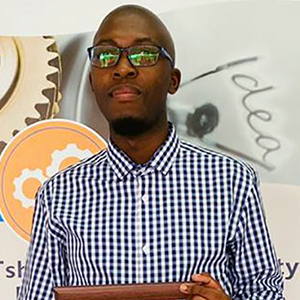
Kgalabe Mongatane (1st prize-winner: Electricity and Energy)
Project Name: Eco-Ba portable washbasin Eco-Ba is a portable and self-assembly washbasin that eliminates the need for a costly piped network and plumbing.
The Tshwane InterUniversity Innovation Challenge 2020 finally came to a spectacular close on 27 November 2020 with an awards ceremony to announce and celebrate the top innovators.
It has been a long journey since the challenge was first launched exactly a year ago, on the same day in 2019, by various stakeholders and the City of Tshwane. The teams from Unisa, the Tshwane University of Technology (TUT) and the University of Pretoria (UP), who participated in the challenge, presented their final pitches on 24 and 25 November 2020.
The ceremony was attended by delegates from the students to the public and private sector who participated in the final pitches. Unisa was represented by its Principal and Vice-Chancellor (VC), Prof Mandla Makhanya.
"I was particularly impressed by the quality and standard of the pitches. It’s heartening to see important competitions such as this helping to build the innovators of the future," the VC said.
The event was streamed live on Unisa’s Facebook page and hosted by seasoned radio personality Ashraf Garda, who kept the guests engaged and entertained.
- There were twelve places up for grabs in four categories:
- Electricity and energy
- Waste management
- Revenue collection (the third place in this category was not presented)
- Transportation
Unisa secured three places, of which two were for projects led by women innovators.
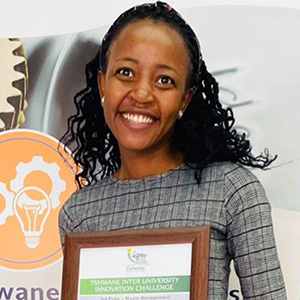
Pertunia Ndou (3rd prize-winner: Waste Management)
Project name: Intellectual Waste Convertors The female-led project is about introducing a new bin that will be used to segregate waste.
By claiming top honours in the energy and electricity category, Unisa’s Kgalabe Mongatane earned the opportunity for his innovative idea to become a reality. The award was presented to him by the university’s VC and the Executive Mayor of Tshwane, Randall Williams.
His win brings him seed funding to the tune of R150 000 to develop his project, and he will also participate in the new Blue Ocean Awards to be held in Bordeaux, France, in February 2021.
Two other Unisa teams each secured R50 000 in seed funding opportunities. They were Pertunia Ndou’s team, who took third place in the waste management category, and Immaculate Matloga’s team who was placed third in the transportation category.
Speaking at the awards, held at The Innovation Hub, Tshwane Mayor Randall Williams emphasised that competition winners do not receive cash prizes. Rather, by entering into incubation agreements to develop their innovations, they gain access to seed funding, mentoring and the opportunity to pilot their projects.
Mayor Williams said Tshwane wanted to see the winners build viable businesses, so the city and its partners would be supporting them all the way, releasing funding as milestones were reached.
The innovation challenge is supported by the City of Tshwane and the three universities based in the city, namely Unisa, UP and TUT, along with Entrepreneurship Development in Higher Education (EDHE), Tuksnovation, Eskom, the French Embassy, Human Sciences Research Council (HSRC), The Innovation Hub and the Technology Innovation Agency (TIA).
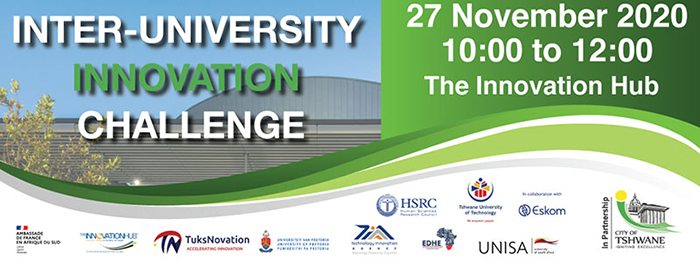
Turning bright ideas into viable businesses
The message from the inaugural Tshwane Inter-University Innovation Challenge was clear: Innovative ideas alone are not enough and must be nurtured and developed into viable business opportunities.
Speaker after speaker at the awards function encouraged students to see their innovations through.
Prof Mashudu Tshifularo from UP led the first team in the world to use 3D-printed bones for reconstructive middle-ear implants in 2019 and challenged students to champion their innovations.
Pointing out that 95% of patents do not make it through to production, he asked students in which percentage they would fall. "Be producers, not consumers," he advised.
Tshifularo said innovators needed to take ownership of their projects and to be ready to grasp funding opportunities and sell their ideas.
Pitching home-grown solutions
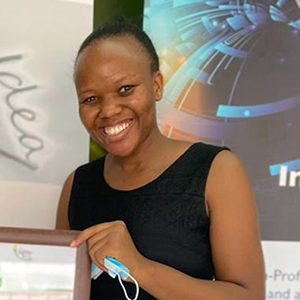
Immaculate Matloga (3rd prize-winner: Transportation)
Project name: BCycle
This initiative, led by a young woman, aims to start introducing other modes of transportation to reduce cars in the central business district (CBD).
The challenge was all about giving students opportunities and for the City of Tshwane to produce home-grown solutions for service delivery challenges.
Eight teams from Unisa, ten from UP and six from TUT took up the challenge and pitched solutions for the City of Tshwane in the four service delivery categories.
The good news for Unisa’s participants who pitched ideas is that the Directorate of Innovation, Technology Transfer and Commercialisation (DITTC) will be on hand to support them. This support will be through the newly established Pre-Incubation Programme, where they will get project management support, intellectual property advice, mentorship support and other services required to take their projects further.
DITTC sees all participants as winners, which is why they extended their support as they see potential in all the solutions offered. The directorate is encouraged by the participation of Unisa students in this challenge and would encourage other students to participate in events like this advertised on the university’s media platforms.
With their wins and participation, the three teams are not only contributing to making Tshwane the City of Innovative Excellence but fulfilling the Unisa vision of being the African university shaping futures in the service of humanity.
* By the Department of Research, Innovation and Commercialisation
Publish date: 2020-12-10 00:00:00.0


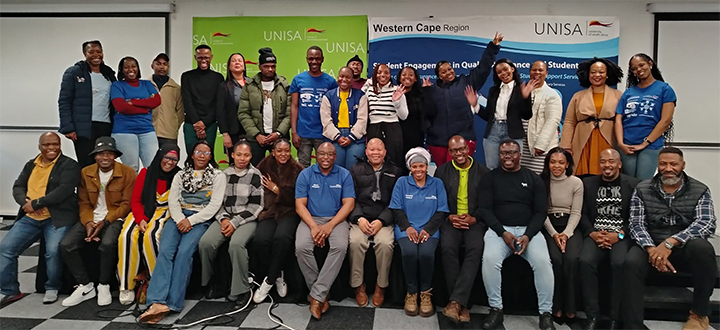 CAS students take centre stage in shaping academic quality and support
CAS students take centre stage in shaping academic quality and support
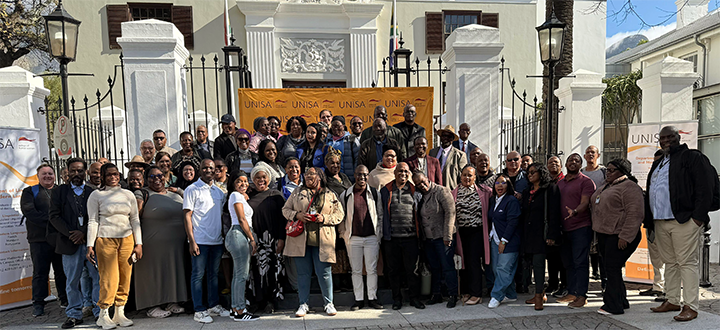 Unisa engaged scholarship project heads to parliament
Unisa engaged scholarship project heads to parliament
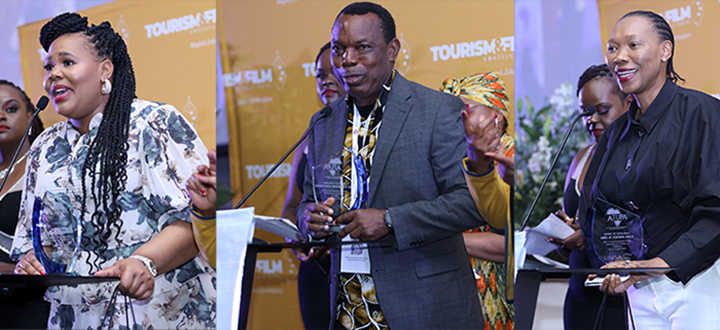 Unisa and ATUPA recognise researchers for ingenuity and innovation
Unisa and ATUPA recognise researchers for ingenuity and innovation
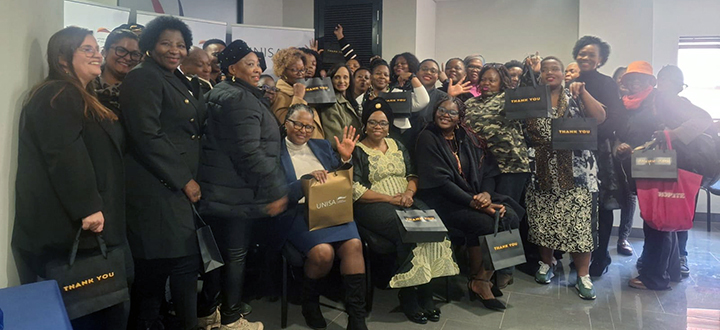 Recognising the unceasing resilience of women
Recognising the unceasing resilience of women
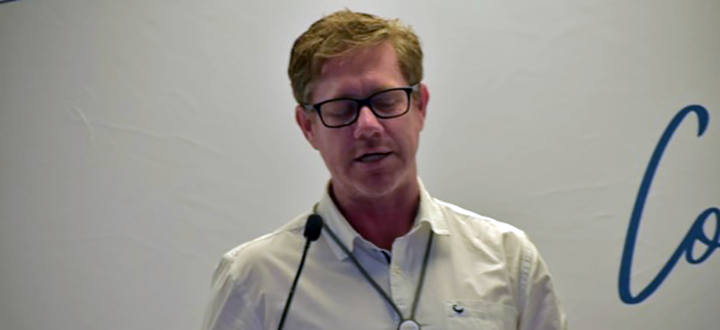 Unisa and SHECASA promote institutional health and safety
Unisa and SHECASA promote institutional health and safety